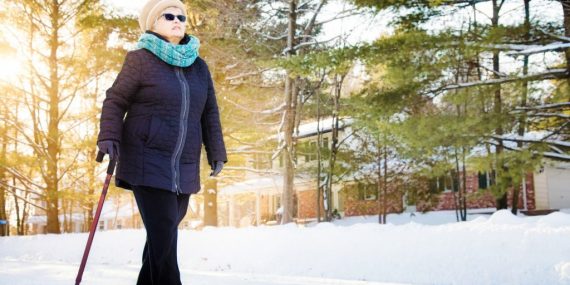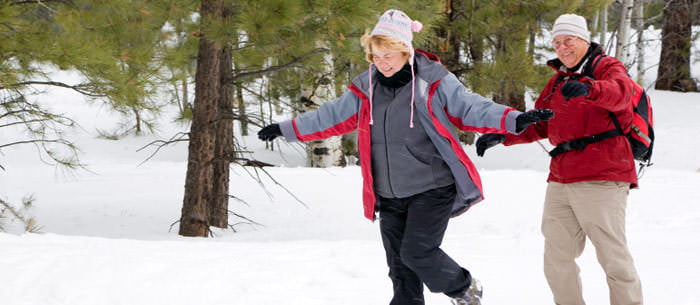1. Avoid Slippery Surfaces
Icy, snowy roads and sidewalks make it easy to slip and fall. Often these falls cause major injuries such as hip and wrist fractures, head trauma and major lacerations. Make sure to wear shoes with good traction and non-skid soles, and stay inside until the roads are clear. Replace a worn cane tip to making walking easier. Take off your shoes as soon as you return indoors because often snow and ice attach to the soles and, once melted, can lead to slippery conditions inside.

2. Dress for Warmth
Cold temperatures can lead to frostbite and hypothermia — a condition where the body temperature dips too low. According to the CDC, more than half of hypothermia-related deaths were of people over the age of 65.
Staying indoors? Dress in layers. Going outside? Wear warm socks, a heavy coat, a warm hat, gloves and a scarf. In very cold temperatures, cover all exposed skin. Use a scarf to cover your mouth and protect your lungs.

3. Fight Wintertime Depression
Because it can be difficult and dangerous to get around, many seniors have less contact with others during cold months. This can breed feelings of loneliness and isolation.
To help avoid these issues, family members can check in on seniors as often as possible; a short, daily phone call can also make a big difference. Seniors can also arrange a check-in system with neighbors and friends, where each person looks in on one or two others daily.
It is also helpful to enjoy some sunlight. Open the curtains or go outside for a little while (if it’s not too cold). If going outside is an option, remember to dress in layers.

4. Eat a Varied Diet
Because people spend more time indoors and may eat a smaller variety of foods, nutritional deficits — especially Vitamin D deficiency — can be a problem. It is recommended to consume foods that are fortified with Vitamin D, such as milk, grains and seafood options like tuna and salmon.

5. Fight the Flu
Peak flu season arrives in most parts of the country just after the holidays. Older adults are at higher risk for developing it. If your aging loved one hasn’t done so already, encourage them to get a flu shot. It’s one of the best ways to prevent being bitten by the bug.

Stay safe everyone!
